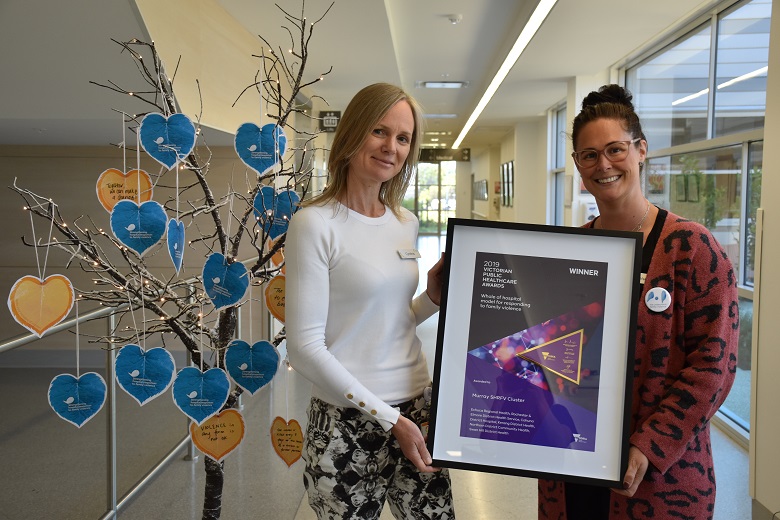
Echuca Regional Health (ERH) leads the Strengthening Hospital Response to Family Violence (SHRFV) initiative across six health services including: Rochester and Elmore District Health Service (REDHS), Cohuna District Hospital (CDH), Kerang District Health (KDH), Northern District Community Health (NDCH) and Swan Hill District Health (SHDH), aptly named the “Murray SHRFV Cluster”. For over twelve months ERH’s Cynthia Opie led the implementation of the initiative across the cluster. “The initiative seeks to improve the identification of and response to family violence among both staff and consumers experiencing family violence” Cynthia said.
A digital orientation package for all new staff and an online foundation eLearning Module was developed and embedded across the cluster in addition to face to face training for frontline staff. “It is important that all employees across the cluster understand family violence and that the driver of family violence is gender inequality” Cynthia said. All six health services share a vision for a community free from violence. “It has been heart-warming to lead the initiative with the full support of all of the Chief Executives and broader health service teams who have welcomed the partnership approach and have valued the need” Cynthia said.
ERH CEO Nick Bush said “Winning the 2019 Victorian Public Healthcare Award for the ‘whole of hospital model for responding to family violence’ category as a cluster, is testament to the united vision shared among the health services.”
Recently, Cynthia has moved into a different role at ERH and Chelsea Nevin has commenced as the SHRFV Cluster Lead. As a Social Worker at ERH, Chelsea is looking forward to continuing to embed a culture of change to ensure first line responders are confident in recognising and responding to family violence. “Victim survivors are unlikely to present to a health professional and openly disclose that they are experiencing family violence. This could be due to a number of reasons including shame, embarrassment and fear of retribution. It is up to us as health professionals therefore, to identify the signs and ask the right questions so that we can sensitively provide support” Chelsea said.
One in four women will experience family violence at the hands of their current or former partner. “Family violence is pervasive and can lead to chronic toxic stress that impacts a person across their lifespan and may as a result contribute to one of the top five chronic conditions: Ischaemic Heart Disease, Type 2 Diabetes Mellitus, Obesity, Cancer and Chronic Obstructive Pulmonary Disease” Chelsea said. “It is important as health professionals that we understand the link between family violence, toxic stress and chronic conditions to enable an effective and sensitive response as early as possible” Chelsea said.


